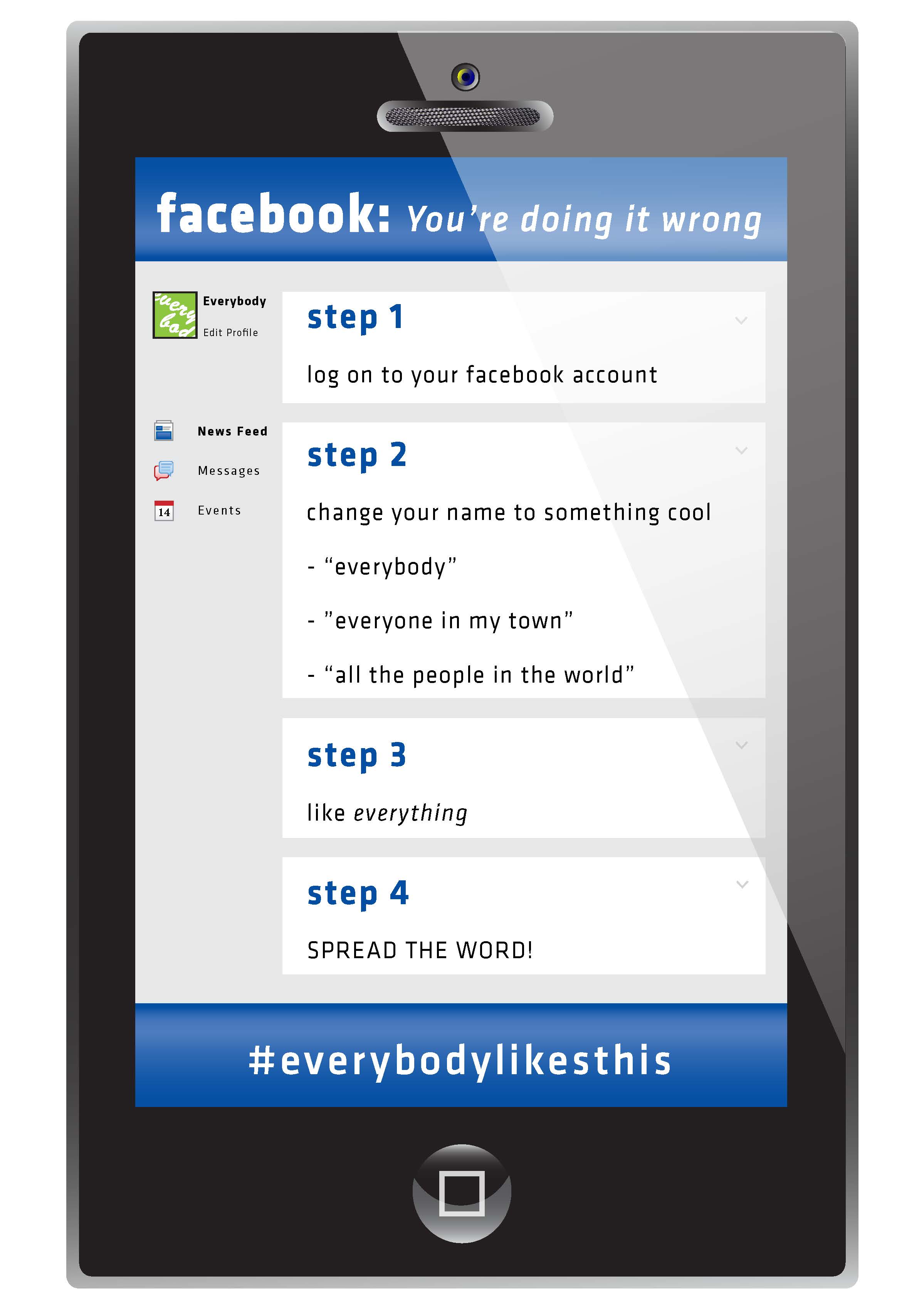Facebook: You're Doing It Wrong
by kelliebeatty

Files
This work has not been commented by curators.
Title
Facebook: You're Doing It Wrong
Headline
Facebook: You're Doing It Wrong
Concept author(s)
Kellie Beatty
Concept author year(s) of birth
1994
Concept author(s) contribution
I (Kellie Beatty) was the sole author of this project
Concept author(s) Country
Australia
Friendly Competition
Radical intimacies: dialogue in our times (2014)
Competition category
Visual communication practice
Competition subcategory
static
Competition field
academic
Competition subfield
student
Subfield description
Federation University (Ballarat Campus)
Check out the Radical intimacies: dialogue in our times 2014 outlines of Memefest Friendly competition.
Description of idea
Describe your idea and concept of your work in relation to the festival outlines:
There are many negative associations between youth and the Internet today. It is believed to be unhealthy for development both physically and mentally as suggested by recent statistics. One in every 25 teens had "problematic Internet use" in a new study of high school students from Connecticut.
What's more, those students who reported an "irresistible urge" to be on the Internet and tension when they weren't online were more likely to be depressed and aggressive and to use drugs than their peers. I began to think about this report and I believed there was a way to make the online world a healthier environment for everyone.
My idea for the festival was to advertise Facebook positively, and represent social media in a generally positive light. Based on personal observations, I noticed that popularity today is generally determined in accordance with the amount of likes or comments a particular picture or status gets; the higher the number, the more popular the person.
What kind of communication approach do you use?
Keeping this general consensus in mind, I began to imagine what it would be like if the numbers of likes were irrelevant, and everyone instead appreciated their peers ideas, thoughts and opinions. Developing this idea further, I decided to create an instructional poster, designed to emphasise the importance of every Facebook user.
What are in your opinion concrete benefits to the society because of your communication?
I chose to use the Facebook layout in a smartphone because it identifies with a large audience, and therefore would reach a majority of the population. There are only four instructions and they are by no means complicated. They are simple and straight to the point so I feel it will encourage others to join the experiment. It will also begin to reflect the impact of communication online, and if used correctly it doesn’t need to be a negative cloud hanging over our society.
What did you personally learn from creating your submitted work?
From this work, I discovered that although communication seems to be turning the population into a derogatory and unappreciative group, it is possible to turn this around. Clearly, Facebook and other forms of social media are here to stay. Rather than tackling the issues surrounding dialogue, a stronger approach would be to work with it instead. The aim to bring successful dialogue back is not difficult, but it does require a lot of commitment. Using the countless features the Internet has to offer, we can gain the attention of those around us and spread the word of a new, interactive world, turning technological dialogue into a positive action.
Why is your work, GOOD communication WORK?
I believe my work is good communication as it effectively attracts a large audience. This is due to the incorporation of modern technology and communication means. It is accessible to everyone today and is displayed in an open forum and also on the street – allowing anyone to apply the instructional change wherever they are, whenever they want.
Where and how do you intent do implement your work?
I started the experiment myself by changing my profile name to “Everybody”. By doing this, everything on Facebook I liked would instead display “Everybody likes this” rather than my original name. This showed the user that they were popular in their own right. I also created a Facebook page of the same name so when it would appear in newsfeeds it would simply read “Everybody likes everybody” or even “Everybody and seven other friends like Everybody” with a few of my peers jumping on board.
I opted to create the instructional in the form of a poster; starting with viewers in the street and hoping they applied it to their own profiles. The message behind this was explanatory as the application showcased the constructive idea in a few simple words.
Did your intervention had an effect on other Media. If yes, describe the effect? (Has other media reported on it- how? Were you able to change other media with your work- how?)
My intervention is in the process of having an effect on other media. It incorporates the use of hashtags, and they can be used over a variety of platforms. Every time the hashtag is used it is furthering the impact of creating change in dialogue and spreading the application to challenge others.
